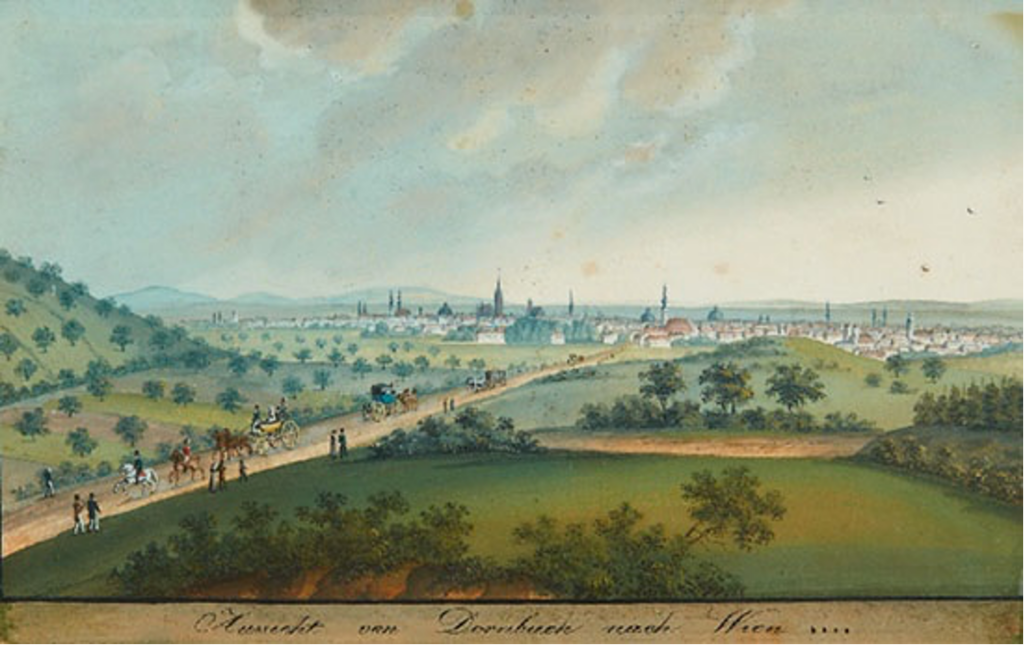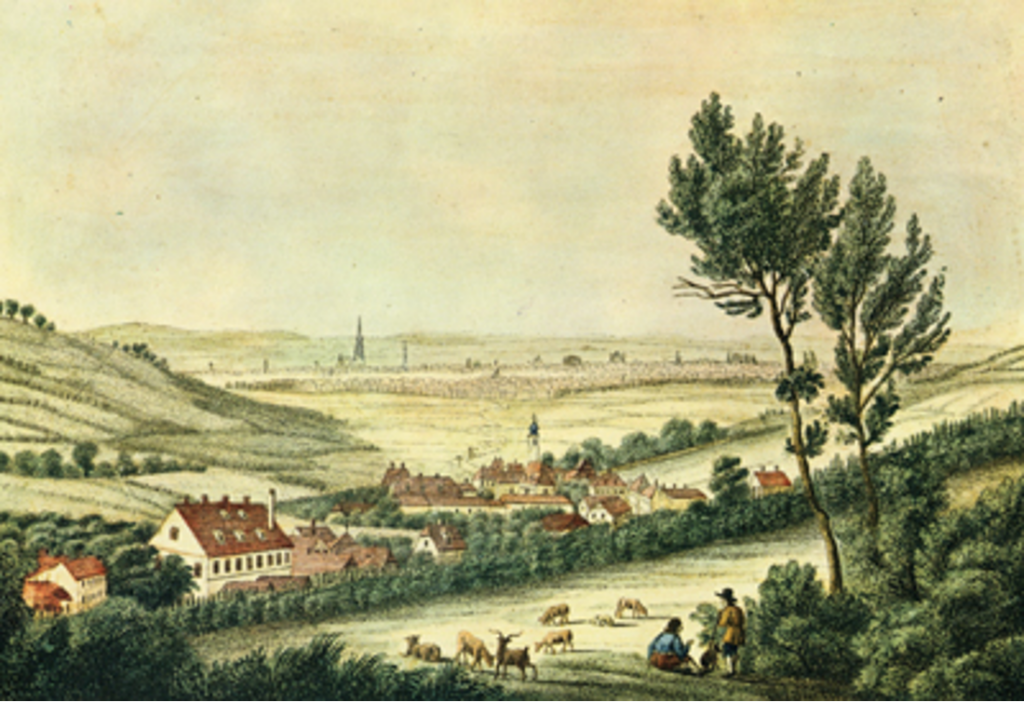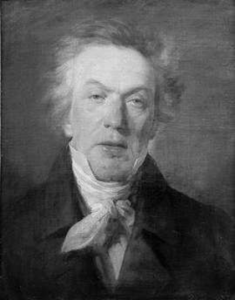The song in the countryside
(Poet's title: Das Lied im Grünen)
Set by Schubert:
D 917
[June 1827]
Ins Grüne, ins Grüne,
Da lockt uns der Frühling, der liebliche Knabe,
Und führt uns am blumenumwundenen Stabe
Hinaus, wo die Lerchen und Amseln so wach,
In Wälder, auf Felder, auf Hügel, zum Bach,
Ins Grüne, ins Grüne.
Im Grünen, im Grünen,
Da lebt es sich wonnig, da wandeln wir gerne
Und heften die Augen dahin schon von ferne,
Und wie wir so wandeln mit heiterer Brust,
Umwallet uns immer die kindliche Lust,
Im Grünen, im Grünen.
Im Grünen, im Grünen,
Da ruht man so wohl, empfindet so Schönes
Und denket behaglich an dieses und jenes
Und zaubert von hinnen, ach, was uns bedrückt,
Und alles herbei, was den Busen entzückt,
Im Grünen, im Grünen.
Im Grünen, im Grünen,
Da werden die Sterne so klar, die die Weisen
Der Vorwelt zur Leitung des Lebes uns preisen,
Da streichen die Wölkchen so zart uns dahin,
Da heitern die Herzen, da klärt sich der Sinn,
Im Grünen, im Grünen.
Im Grünen, im Grünen,
Da wurde manch Plänchen auf Flügeln getragen,
Die Zukunft der grämlichen Aussicht entschlagen,
Da stärkt sich das Auge, da labt sich der Blick,
Leicht tändelt die Sehnsucht dahin und zurück,
Im Grünen, im Grünen.
Im Grünen, im Grünen,
Am Morgen, am Abend, in traulicher Stille,
Da wurde manch Liedchen und manche Idylle
Gedichtet, gespielt, mit Vergnügen und Schmerz,
Denn leicht ist die Lockung, empfänglich das Herz
Im Grünen, im Grünen.
Ins Grüne, ins Grüne
Lasst heiter uns folgen dem freundlichen Knaben,
Grünt einst uns das Leben nicht fürder, so haben
Wir klüglich die grünende Zeit nicht versäumt
Und, wann es gegolten, doch glücklich geträumt,
Im Grünen, im Grünen.
Into the countryside, into the countryside!
Spring, that lovely lad, is luring us there
And leading us with a staff that has flowers twisted around it,
Outside, where the larks and blackbirds are so awake,
Into the woods, onto the fields, onto the hills, to the river,
Into the countryside, into the countryside.
In the countryside, in the countryside!
There you can live happily, there we can happily walk around,
And we fix our eyes on it even when far away;
And how we walk with such a cheerful breast,
We are always surrounded by childlike pleasure,
In the countryside, in the countryside.
In the countryside, in the countryside,
You can rest so well there, experience such beautiful things,
And cosily think about this and that,
And cast a spell to drive away whatever is oppressing us,
And attract towards us what delights the breast,
In the countryside, in the countryside.
In the countryside, in the countryside,
There the stars become so clear, as the sages
Of the ancient world praised them as a guide for our life.
There the little clouds waft past so tenderly,
There hearts become more cheerful, the mind becomes clearer,
In the countryside, in the countryside.
In the countryside, in the countryside,
Lots of little projects take flight,
The future casts off its anxious appearance.
There the eye is strengthened, the gaze is refreshed,
There longing can be dallied with lightly,
In the countryside, in the countryside.
In the countryside, in the countryside
In the morning, in the evening, in intimate silence,
There, lots of little songs and idylls
Are written and played, with delight and pain,
For the attraction is light and the heart is receptive
In the countryside, in the countryside
In the countryside, in the countryside!
Let us follow the friendly lad cheerfully!
If a time comes when life is not so green
We will have been wise enough not to have wasted this time of greenery,
And, when it was necessary, we spent our time dreaming happily
In the countryside, in the countryside.
All translations into English that appear on this website, unless otherwise stated, are by Malcolm Wren. You are free to use them on condition that you acknowledge Malcolm Wren as the translator and schubertsong.uk as the source. Unless otherwise stated, the comments and essays that appear after the texts and translations are by Malcolm Wren and are © Copyright.
☙
Themes and images in this text:
Clouds Evening and the setting sun Eyes Green Hearts Larks Morning and morning songs Rivers (Bach) Songs (general) Spring (season) Stars Walking and wandering Woods – large woods and forests (Wald)

Dornbach, where Reil wrote these lines in celebration of the pleasures of escaping to the country, was only a pleasant stroll away from the city centre of Vienna (though the pleasure was probably limited by the noise of the horses and carriages of the many other day-trippers, as can be seen in this print from the early 19th century). It is now not even a separate village but has been absorbed into Hernals, the 17th District of Vienna. All of this reminds us that Pastoral poetry is a product of the city.
This was always the case, even in Roman times. It is only city dwellers who can see country living as easy and relaxing. Those who have to work the land do not have the time or inclination to wander around aimlessly, to watch the clouds, to think about this and that, to come up with plans for the future. They leave the contemplation of the clouds and stars and the composition of poems and songs to the visitors.
Contemplation and creation are central to what this poem is celebrating, of course: the power of green nature to stimulate the human spirit. This is captured in the untranslatable German verb ´grünen´, literally ´to become green´. When we are ´im Grünen´(in the greenery – in the countryside) we can experience this process of ´grünen´, of budding and sprouting. Other poems and poets lauded the value of ‘Waldeinsamkeit’ (being alone in the woods) or ‘Feldeinsamkeit’ (being alone in the fields) in fostering this green refreshment, but Reil’s text is a product of another strand of Germanic Green thinking: the social aspect of being immersed in nature. It is not just the greenery that fosters spiritual and psychological ‘greening’ or blossoming, but also the company of like-minded friends who share the experience. It is not just individual plants that are sprouting but a whole eco-system.
The final stanza suggests that human beings need to take advantage of their ‘greening time’ before it is too late. There will come a point when the new leaves of spring will no longer be green. Seeds will no longer germinate and sprout. Growth will become decay. When Reil invited the 30 year old Franz Schubert to set his poem to music in 1827, did either of them suspect how apt this point was? 18 months later the seemingly evergreen composer was dead.

☙
Original Spelling and notes on the text Das Lied im Grünen Ins Grüne, ins Grüne! Da lockt uns der Frühling der liebliche Knabe, Und führt uns am blumenumwundenen Stabe, Hinaus, wo die Lerchen und Amseln so wach, In Wälder, auf Felder, auf Hügel, zum Bach, Ins Grüne, ins Grüne. Im Grünen, im Grünen! Da lebt es sich wonnig, da wandeln wir gerne, Und heften die Augen dahin schon von ferne; Und wie wir so wandeln mit heiterer Brust, Umwallet uns immer die kindliche Lust, Im Grünen, im Grünen. Im Grünen, im Grünen, Da ruht man so wohl, empfindet so schönes, Und denket behaglich an Dieses und Jenes, Und zaubert von hinnen, ach! was uns bedrückt, Und alles herbey, was den Busen entzückt, Im Grünen, im Grünen. Im Grünen, im Grünen, Da werden die Sterne so klar, die die Weisen Der Vorwelt zur Leitung des Lebens uns preisen. Da streichen die Wölkchen so zart uns dahin, Da heitern die Herzen, da klärt sich der Sinn, Im Grünen, im Grünen. Im Grünen, im Grünen, Da wurde manch Plänchen auf Flügeln getragen, Die Zukunft der grämlichen Aussicht entschlagen. Da stärkt sich das Auge, da labt sich der Blick, Leicht tändelt die Sehnsucht dahin und zurück, Im Grünen, im Grünen. Im Grünen, im Grünen, Am Morgen, am Abend, in traulicher Stille, Da wurde manch Liedchen und manche Idylle Gedichtet, gespielt, mit Vergnügen und Schmerz1, Denn leicht ist die Lockung, empfänglich das Herz Im Grünen, im Grünen. Ins Grüne, ins Grüne! Laßt heiter uns folgen dem freundlichen Knaben! Grünt einst uns das Leben nicht fürder so haben Wir klüglich die grünende Zeit nicht versäumt, Und, wann es gegolten, doch glücklich geträumt, Im Grünen, im Grünen. 1 Schubert appears to have changed Reil's 'Scherz' (fun) to 'Schmerz' (pain)
Note on the text by Peter Rastl
Schubert received Reil’s poem in manuscript form four months before it was printed. Schubert’s manuscript is now in the possession of Stanford University, California. The first printed edition of the song (Leidesdorf, June 1829) and subsequent publications have several textual modifications and include an additional stanza (following stanza 6) not known to Schubert, which might have been provided by Reil:
O gerne im Grünen
Bin ich schon als Knabe und Jüngling gewesen,
Und habe gelernt, und geschrieben, gelesen,
Im Horaz und Plato, dann Wieland und Kant,
Und glühenden Herzens mich selig genannt,
Im Grünen, im Grünen.
Oh, I was happy to go into the countryside
Even when I was a child and a teenager,
And I learned, and wrote, and read
In Horace and Plato, then Wieland and Kant,
And with a glowing heart I regarded myself as blessed
In the countryside, in the countryside.
The first edition further included three stanzas by Reil “als Traueropfer dem Verklärten vom Dichter nachgeweiht und der Melodie unterlegt” (as a funeral offering to the deceased, dedicated by the poet and to be sung to the same melody):
Dem Schläfer im Grünen.
O Schubert! Im Grünen
Hat öfter dies Liedchen dich Heitern erquicket;
Uns aber, wo je du gesungen, entzücket.
Ha! nimmer vergißt sich der Geist, das Gemüth,
Das deinen Akkorden und Liedern entglüht,
Die nimmer vergrünen.
Dein Lied, auch im Grünen
Am grünlichen Quelle der Musen entsprungen,
Wird oft noch im Grünen von Frohen gesungen;
Was göttlich durch dich Polyhymnia sprach,
Das singet die Nachwelt und Mitwelt dir nach,
Mag’s schneien, mag’s grünen.
Ach leider! das Grüne
Hält selbst nun den lieblichen Sänger umfangen,
Doch steigen die Lorbeern im herrlichen Prangen.
Aus seinen Gesängen, die ewig uns grün,
Wird opfernd das Blümchen: Erinnerung blühn.
To the person sleeping in the greenery
Oh Schubert! In the countryside
This little song has often lifted your spirits;
But we have been charmed, wherever you have sung it.
Ha! it can never be forgotten by any spirit, and soul
That has been set glowing by your chords and songs,
Whose green will never fade.
Your song, also in the countryside,
Sprung from the green source of the Muses,
Is still often sung by cheerful people in the countryside;
What Polyhymnia divinely said through you
Will be sung again by posterity and by contemporaries,
In snow or as things turn green.
Alas! The greenery
Has taken hold of the dear singer now,
Yet the laurels are climbing in lordly splendour.
From his songs, which keep us green eternally,
A small flower will become an offering: let memory blossom.
Confirmed by Peter Rastl with Allgemeine Theaterzeitung und Unterhaltungsblatt für Freunde der Kunst, Literatur und des geselligen Lebens. Zwanzigster Jahrgang. Nr. 123. Wien, Sonnabend den 13. October 1827. Herausgeber und Redakteur: Adolf Bäuerle.
To see an early edition of the text, go to page 501 here: http://anno.onb.ac.at/cgi-content/anno?aid=thz&datum=18271013


